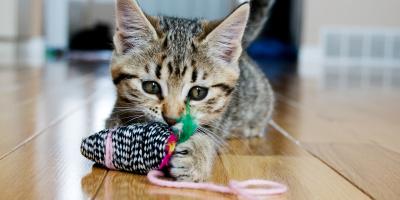How to Keep a Kitten Entertained: Tips for Playful Kittens


Knowing how to entertain a kitten through play can be a useful skill. Play keeps your young cat calm, supports their development, and can prevent bad behavior, such as scratching furniture.
Entertaining kittens also provides a bonding opportunity. Doing a fun activity with your pet shows them that you care, and many pet owners enjoy watching their cats romp around.
Keep reading to learn how to keep your feline companion entertained, including ideas for fun games to play with kittens, best practices, and tips for providing stimulation while you’re away.
How to Play With a Kitten – General Tips
Most kittens become interested in playing like adult cats around six weeks of age. If you’re wondering how to get a kitten to play, here are some tips to remember:
- Try different toys. Many cats respond to toys, but keep in mind that each kitten has their own preferences. It will likely take some trial and error to figure out what toys and activities your pet enjoys.
- Don’t force it. If your kitten doesn’t respond to a toy or just doesn’t seem to want to play, try again later. Remember, shy and scared kittens likely need extra time to become socialized and adapt to play.
- Be safe. Avoid aggressive play, and don’t put your kitten in situations where they (or you) might get injured.
How Often Should I Play With My Kitten?
Fitness is essential to keeping your kitten healthy. So, try to keep them engaged in play for around 30 minutes per day, divided between several sessions. This can include games with you, such as kitten hide-and-seek, as well as time they might spend alone with a toy. Kittens who are especially active may need more activity.
How Long Should I Play With My Kitten Before Bed?
Playing with your kitten before bed can be a good way to help them get tired so they sleep through the night. (Include this session in your routine of 30 minutes of play per day.)
How long you play with them depends on the individual cat. If your pet had a lazy day, consider a longer play session. Kittens who are already tired, on the other hand, may not need much activity to help them settle in for the night.
If your pet tends to be active after you go to bed, try increasing their amount of exercise during the day. It may also be helpful to know how to keep a kitten entertained at night, however. Providing access to toys (ideally ones that don’t make noise) and things like a cat tree and scratching post can tire them out.
How to Keep a Kitten Entertained While at Work
It’s good for your kitten to learn how to keep themselves entertained. Whether you leave your home to work or run errands, you can’t always be their playmate.
If you’re unsure how to keep your kitten entertained during the day, here are a few options:
- Rotate their toys. Keep your cat occupied with a variety of kitten toys that you regularly rotate to avoid boredom.
- Use a puzzle feeder. Some feeding toys are designed to be puzzles for kittens. They require your pet to strategize how to access a bit of food or cat treats hidden inside.
- Create a space to perch. Many cats enjoy settling on an elevated perch to watch their environment. A perch by the backyard window may be especially appealing.
- Set a relaxing mood. Whether it’s a playlist of soothing noises for kittens or music you choose, sound may create a calm and stimulating environment for your cat while you’re away. Search “sounds to relax kittens” or “music for kittens” online for ideas.
Can You Overplay With a Kitten?
It is possible to overplay with your kitten. It’s true young cats have a lot of energy, but even they have their limits. Usually, they will walk away when they’re done playing, but there are other signs that they’re tired or overstimulated.
If you’re wondering, Can you play too much with a kitten?, watch for behavior indicating agitation or stress, such as rough play. In these moments, it’s important to end playtime.
Is My Kitten Aggressive or Playful?
As a pet owner, it can be hard to know if your kitten is aggressive or playful. If you’re looking for signs that your kitten plays too rough, consider these behaviors (and when they occur).
Biting & Scratching
Kitten play-biting may occur if the two of you are, say, playing with a toy. While it’s recommended to teach your kitten not to bite, they may not intend to cause harm. The same goes for scratching.
If, however, the bite or scratch seems targeted at a specific area of your body, is hard enough to break the skin, and is accompanied by other signs of agitation, this is likely aggression.
Growling
If your kitten growls while playing, end the play session. Growling is often intended as a warning to others to back off. Additionally, do not try to take the toy back from your cat. Rather, distract them with a treat or just let them have it for the time being. Eventually, they’ll lose interest.
Body Language
During play, your kitten’s body language should be relaxed. If they become stiff or turn their ears toward the back of their head, they’re no longer having fun.
Occasional overstimulation can be normal, but if your kitten can’t seem to ever play without becoming aggressive, contact your veterinarian.
How to Teach a Kitten to Play Gently
Some kittens may naturally understand the limits of what’s acceptable during playtime. But if their behavior leaves you wondering how to tell if a kitten is playing or fighting, here are some tips for dealing with it:
- Don’t use your hands to play with your cat, as they’ll interpret them as just another toy.
- End playtime the instant your cat shows aggression and walk away.
- Avoid punishment, as this will likely make your cat afraid of you rather than teach a lesson.
Kitten Entertainment Ideas
The myPurina app has a library of games and enrichment exercises that can help you keep your kitten busy. Some kitten entertainment ideas include:
- Games. There are a variety of fun games to play with your cat that allow them to engage their predatory instincts, as well as burn off excess energy.
- Do-it-yourself (DIY) toys. Cat toys don’t have to cost a lot to be fun. Whether it’s a DIY cat wand or a cat castle made from a used box, playtime can be affordable.
- Enrichment activities. Enticing your kitten with moving objects, creating pet forts and treasure hunts, or playing a game of “Kitten Hide and Seek” can be good ways to provide physical and mental enrichment.
- Media. Your pet may enjoy watching videos for kittens online that feature animals, such as birds and fish, in their natural habitat. Additionally, a digital fish game for kittens might also interest them. Be careful, though – some cats may become overexcited and try to interact with the animals, potentially scratching your device.
How to Play With a Kitten Without Toys
While toys are helpful, they’re not always necessary to keep your kitten entertained. In some cases, household objects may be all you need to play fun kitten games.
Dragging your cat's favorite toy across the floor may get your cat to pounce and stalk, while a ping pong ball might be great for a game of fetch. Boxes and paper bags can also be set up as appealing objects for your pet to climb in and out of.
Just remember, always put away toys after play.
Can a Kitten Have Catnip?
Catnip is an herb that can stimulate feelings of happiness and affection in some felines, and playfulness and even aggression in others. Not all cats respond to catnip.
If you’re wondering about catnip for kittens, try offering some to your young cat (when placed inside a puzzle toy, it may motivate your kitten to play). Note, however, kittens might not react to the herb until at least six months of age.
Ask your veterinarian about how much catnip can be given to your kitten.
Is it Normal for a Kitten to Not Be Playful?
Some cat breeds are known for being more active than others. For example, a Siamese or Abyssinian may have more energy than, say, a Persian or Himalayan.
It’s also possible that, no matter their breed, your kitten would rather lay in your lap than chase a toy. As long as they’re healthy, low-key kittens are normal and aren’t cause for concern. If they suddenly become lethargic, however, contact your veterinarian.
For more expert tips on your kitten, explore our other kitten behavior articles.

Be Rewarded for Your Purina Purchases
Earn and redeem points for Purina products with myPurina app.






